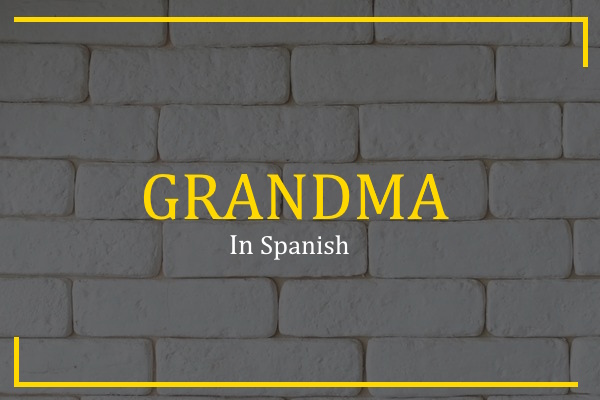Table of Contents
Are you familiar with how to say grandma in Spanish? In an exact translation, you would call her “Abuela”. But if your grandma is of Spanish descent or speaks Spanish only, you may want more. Ultimately, we want you to be able to call your grandmother by different nicknames as you build up your vocabulary. You will also know what native speakers mean when they refer to their nannies after reading this post.
Grandma in Spanish: Abuela
Abuela
In Google Translate, typing “grandma” will give you “abuela”. The mother of one of your parents is commonly referred to as such in Spanish. Spanish native speakers use this word in all countries, and it is understood by everyone. It is normal for native speakers to shorten words whenever they want.
Abue
It means simply the same as Abuela and it is a short form. Upon looking at the word “Abue”, you might notice that there is no “La” at the end. The purpose of shortening words in this way is to communicate a feeling of familiarity with the person they’re speaking with. The same thing is done when it comes to names, but that’s a different story.
Awe
The letter “b” is stressed in this word since native speakers use it to emphasize the word “abue”. This seems like a lazy way of avoiding saying that letter. The pronunciation of “Awesome” in English is different from how you are currently reading it. It is pronounced AA-OO-EH by Spanish speakers.
This is a very common way children call their grandparents because they are not so skilled when they speak. Despite this, adults continue to use this word throughout their lives to show affection to their grandmothers.
Abu
The word “Abuela” may be shortened by some native speakers so that it misses the “ela”. They do this purely for sentimental reasons. To be honest, calling your grandmother Abu is not a very common thing to do in Colombia, but I have heard native speakers from other countries use it. It is also used to say grandma in different languages and in some languages, it used for father.
Wela
Another incorrectly pronounced shortened version of “abuela” is “Wela”. Spanish teachers will tell you, and they’re right, that this isn’t what people use in real life, but it’s how they talk and you have to be ready to understand them.
Abuelita
The Spanish language uses a lot of diminutives. People sometimes do this to show affection for the topic they’re discussing. An example is “Abuelita”.
Lita
When you learn the word Abuelita, you will notice that native Spanish speakers also shorten it. This time around, we’re skipping “abue” and using “lita” to say, grandma. It is most often children who make this mistake, but adults tend to do it as well to maintain their “affection” for grandma.
Agüelita
This is a mistake Colombians make all the time, and your Spanish teachers will probably hate you for learning it. People who say this, especially those who aren’t very educated, usually come from the poorer parts of society.
There are also many instances of little children with problems pronouncing it. Is it appropriate to use it? The answer is no. However, you might hear native speakers use it.
Mamita
Alternatively, you can call your grandmother by the nickname “Mamita”, which is the diminutive form of “Mom”. You are referring to your grandmother as if she were your mother when you use this word. The nickname is usually used by Colombians.
Mita
It is a shortened version of “Mamita”. We only say “Mita” and skip “Ma”.

Arslan Hussain, founder of The Different Languages, is an experienced translator passionate about languages and cultures. Through his website, he shares his knowledge and love for different languages, making learning accessible and enjoyable.

